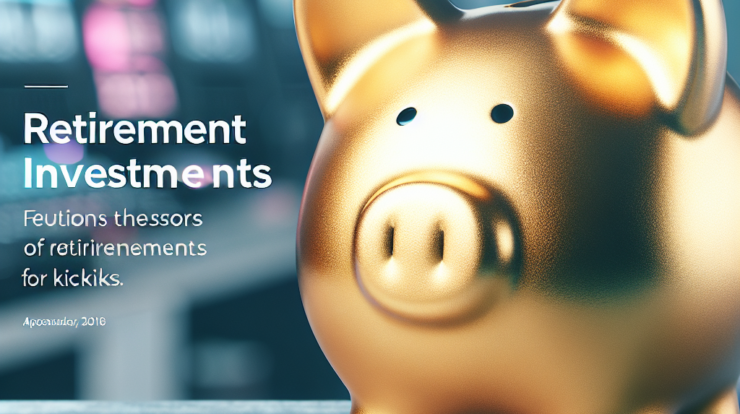
If you are a hotel industry worker looking to secure your financial future, then retirement investments are a crucial consideration. With the nature of the hospitality industry, it is essential to have a plan in place that will provide you with a comfortable retirement. In this article, we will explore the various retirement investment options available to hotel industry workers, helping you make informed decisions and ensure a prosperous future for yourself. From 401(k) plans to individual retirement accounts (IRAs) and annuities, we will discuss the benefits and risks associated with each option, enabling you to choose the one that best suits your needs and goals. So, let’s get started on your journey towards a worry-free retirement!
Retirement Investments for Hotel Industry Workers
Are you a hotel industry worker? If so, it’s important to start planning for your retirement as early as possible. Retirement investments can provide you with financial security and freedom when you decide to stop working. In this article, we will explore the importance of retirement investments, the challenges faced by hotel industry workers, the types of retirement accounts available, investment options within those accounts, considerations for choosing investment options, tax considerations, professional financial advice, planning and adjusting retirement savings, monitoring and reviewing retirement investments, and the importance of starting early.
Importance of Retirement Investments
Retirement investments play a crucial role in ensuring a comfortable and financially secure future. As a hotel industry worker, it’s important to prepare for retirement because your job may not provide a pension plan or adequate savings on its own. By investing in retirement accounts, you can build a nest egg that will provide you with income during your golden years.
Challenges Faced by Hotel Industry Workers
Hotel industry workers often face unique challenges when it comes to retirement planning. Many workers in this industry earn lower wages, which can make saving for retirement difficult. Additionally, the hotel industry is known for its fluctuating job market, with periods of high demand and periods of low demand. This can lead to inconsistent income and a lack of job stability, making it even more important to have a solid retirement plan in place.
Types of Retirement Accounts Available
There are several types of retirement accounts available for hotel industry workers to consider. The most common options include:
1. IRA (Individual Retirement Account)
An IRA is a personal retirement account that allows you to contribute a certain amount of money each year. Traditional IRAs offer potential tax benefits, while Roth IRAs allow for tax-free withdrawals in retirement. It’s important to understand the differences between the two and choose the one that aligns with your financial goals.
2. 401(k) Plan
A 401(k) plan is an employer-sponsored retirement account that allows employees to contribute a portion of their salary on a pre-tax basis. Some employers match a percentage of the employee’s contribution, which can significantly boost retirement savings. Hotel industry workers should take advantage of any 401(k) plans offered by their employers.
3. Pension Plans
Though less common in the hotel industry, some workers may have access to pension plans. These plans provide a guaranteed income in retirement based on years of service and salary. If a pension plan is available to you, it’s important to understand the details and take advantage of this valuable benefit.
Investment Options Within Retirement Accounts
Once you have established a retirement account, you’ll need to decide how to allocate your investments within it. There are several investment options to consider:
1. Stocks
Investing in individual stocks allows you to become a partial owner of a company. Stocks have the potential for high returns but also come with higher risks.
2. Bonds
Bonds are fixed-income securities that pay interest over a specified period. They are generally considered a safer investment option compared to stocks.
3. Mutual Funds
Mutual funds pool money from multiple investors to invest in a diversified portfolio of stocks, bonds, or other assets. They offer a convenient way to invest in a variety of securities.
4. Real Estate Investment Trusts (REITs)
REITs are companies that own, operate, or finance income-generating real estate. Investing in REITs allows you to gain exposure to the real estate market without directly owning property.
5. Exchange-Traded Funds (ETFs)
ETFs are similar to mutual funds but can be bought and sold on stock exchanges throughout the trading day. They offer diversification and lower costs compared to some mutual funds.
Considerations for Choosing Investment Options
When selecting investment options for your retirement accounts, there are several factors to consider:
1. Risk Tolerance
Evaluate your comfort level with taking investment risks. Generally, younger workers can take on more risk for potentially higher returns, while older workers may prefer more conservative investments.
2. Age and Timeframe
Consider your age and the number of years until retirement. The closer you are to retirement, the less time you have to recover from any investment losses.
3. Financial Goals
Identify your financial goals and how your retirement investments can help you achieve them. Whether it’s a certain income in retirement or funding future expenses, align your investments with your specific goals.
Benefits of Diversification
Diversification is the practice of spreading your investments across different asset classes. This strategy offers several benefits for hotel industry workers:
1. Spreading Investment Risk
By diversifying your investments, you can reduce the risk associated with a single investment. If one investment performs poorly, others may perform well and offset any losses.
2. Maximizing Potential Returns
Diversification allows you to participate in the potential growth of different asset classes. When one investment performs well, it can help offset any underperformance in other areas.
Tax Considerations for Retirement Investments
Understanding the tax implications of your retirement investments is crucial. There are different tax considerations to keep in mind:
1. Tax-Deferred vs. Tax-Free Accounts
Traditional IRAs and 401(k) plans are tax-deferred, meaning you contribute pre-tax money and pay taxes upon withdrawal. Roth IRAs and Roth 401(k) plans offer tax-free withdrawals in retirement but require contributions with after-tax money.
2. Taxable Investments
Investments held outside of retirement accounts may be subject to capital gains taxes. Consider the tax implications of buying and selling investments.
Professional Financial Advice and Guidance
Seeking professional advice when planning for retirement is highly recommended. Consider the following options:
1. Certified Financial Planner (CFP)
A CFP is a professional who can provide comprehensive financial planning services, including retirement planning. They have a deep understanding of various investment options and can help tailor a plan to your specific needs.
2. Financial Advisors
Financial advisors can offer guidance on retirement investments and help you create an investment strategy aligned with your goals. Choose a reputable advisor who has experience working with hotel industry workers.
3. Investing Apps and Robo-Advisors
Investing apps and robo-advisors provide automated investment management services. They use algorithms to create and manage a diversified investment portfolio based on your risk tolerance and financial goals.
Planning and Adjusting Retirement Savings
To ensure your retirement savings are on track, follow these steps:
1. Determine Retirement Expenses
Estimate how much you will need to cover your living expenses in retirement. Consider factors such as housing, healthcare, and travel.
2. Calculate Retirement Income Sources
Identify all potential sources of retirement income, including Social Security, pensions, and other investments. This will give you an idea of how much you need to save on your own.
3. Determine Required Savings Rate
Based on your retirement expenses and income sources, calculate the rate at which you need to save to meet your retirement goals. Adjust your budget and expenses accordingly.
4. Adjust Savings Rate as Needed
Regularly review your savings rate and make adjustments if necessary. As your financial situation and goals change, you may need to save more or less to stay on track.
Monitoring and Reviewing Retirement Investments
As you near retirement, it’s important to monitor and review your retirement investments regularly:
1. Regularly Review Investment Performance
Keep an eye on the performance of your investments. If certain investments consistently underperform or don’t align with your goals, consider making changes.
2. Rebalance Portfolio
Periodically rebalance your investment portfolio to maintain your desired asset allocation. This involves selling some investments and buying others to bring your portfolio back in line.
3. Review and Update Retirement Plan
Review and update your retirement plan as needed. As you get closer to retirement, your goals and circumstances may change, requiring adjustments to your investment strategy.
Importance of Starting Early
Starting your retirement savings early can have significant benefits:
1. Power of Compound Interest
Compound interest allows your investments to grow exponentially over time. The earlier you start, the more time your money has to compound and grow.
2. Greater Time to Recover from Market Downturns
By starting early, you have a longer time horizon to recover from market downturns. Over the long term, the stock market has historically shown resilience and growth.
Conclusion
As a hotel industry worker, it’s essential to prioritize your retirement investments. By understanding the available retirement accounts, investment options, tax considerations, and seeking professional advice, you can build a secure financial future. Start planning early, regularly review and adjust your retirement savings, and remember the power of compound interest. With the right strategy and discipline, you can enjoy a comfortable retirement and the peace of mind that comes with financial security.









